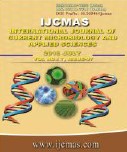


 National Academy of Agricultural Sciences (NAAS)
National Academy of Agricultural Sciences (NAAS)

|
PRINT ISSN : 2319-7692
Online ISSN : 2319-7706 Issues : 12 per year Publisher : Excellent Publishers Email : editorijcmas@gmail.com / submit@ijcmas.com Editor-in-chief: Dr.M.Prakash Index Copernicus ICV 2018: 95.39 NAAS RATING 2020: 5.38 |
The field evaluation of composts prepared out of enzyme industrial wastes and municipal solid waste was carried out in farmer’s field in Bangalore, India using maize as a test crop in a randomized complete block design with nine treatments and 3 replications. Two composts: MEES compost and PS compost and fertilizers were used to know the effects on soil properties and agronomic characteristics and nutrient uptake by maize plants. Application of MEES compost and PS compost resulted in increased soil pH and organic carbon content, but the increase was insignificant. The available nutrient concentration was slightly higher than the initial soil on application of organics like composts and waste materials. The application of 100 % NPK +FYM @ 10 tha-1 recorded higher growth, grain yield (6341.47 kg ha-1) and straw yield (11416.46 kg ha-1) of maize. The status of available nutrients in soil, nutrient contents in maize and uptake by maize was higher with the application of 100 % NPK +FYM @ 10 tha-1. The application of both MEES compost and PS compost resulted in grain yields of 5517.48 and 5249.12 kg ha-1 and stalk yields of 9931.47 and 9448.41 kg ha-1 respectively and the performance was on par with each other. Application of composts did not result in heavy metals (Ni, Cd, Pb and Cr) accumulation in the soil as well as maize grain and stalk. The study thus revealed the suitability of enzyme industry wastes composts as organic nutrient source for use in agriculture.
 |
 |
 |
 |
 |